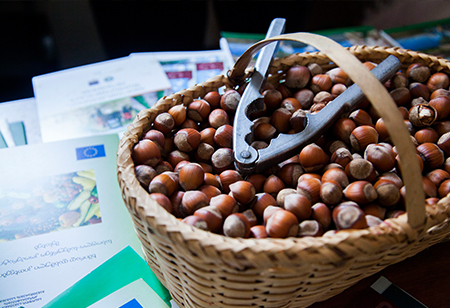Report by EUMM:
Cross boundary trade is booming between Georgia and Abkhazia

The borders are closed, the lands are separated and the controlled crossing points strictly prohibit movement between Georgia and its breakaway Abkhazia region, however life still continues and people behind the border are increasing their grassroots contact.
Despite the ban on importing and exporting food products and industrial goods to and from Abkhazia, demand on both sides of the Administrative Boundary Line (ABL) encourages booming trade across the so-called border, says a report by the European Union Monitoring Mission in Georgia (EUMM).
The report revealed the bulk of trade was in fruit and vegetables.
These commodities are seasonal in nature and the trade therefore peaks in the summer months. Hazelnuts are by far the most exported product from Abkhazia, whereas fruits, berries and vegetables are the most imported commodity to the breakaway [region],” said EUMM Georgia.
As much as 3,000kg of produce per day has been regularly observed passing into Abkhazia through just one controlled crossing point, said EUMM Georgia.
The final destinations for much of the produce are markets in major Abkhazian cities but the goods also travel beyond Abkhazia,” said the report.
Open sources indicated that up to 70 percent of the agricultural products available in the Abkhazian town of Gali were imported from Tbilisi administered territory. A 2014 media estimate pointed to a yearly Abkhaz cross boundary import value of $58 million USD.
According to the EUMM Georgia report grassroots contacts between Georgians and Abkhazians were increasing despite various obstacles.
Each day up to several thousand commuters cross the Enguri River, many to conduct suitcase trade in Abkhazia of commodities and agricultural goods but also pharmaceuticals and medical equipment,” said the report.
Arbitrary practice commuters to Abkhazia are allowed bring goods with them but are often requested to pay import duties on larger quantities,” said the monitoring agency.
Custom duties and export fees collected by the Abkhaz de facto border guards vary according to the season and other factors.
Twenty-four years have passed since the Georgia-Abkhazia conflict, which ended in September 1993.
Between 13,000 and 20,000 ethnic Georgians and approximately 3,000 Abkhaz were reported to be killed, while more than 250,000 Georgians became internally displaced and 2,000 went missing.
A United Nations Secretary General fact-finding mission reported numerous and serious human rights violations were committed by both sides during the war.
 Tweet
Tweet  Share
Share